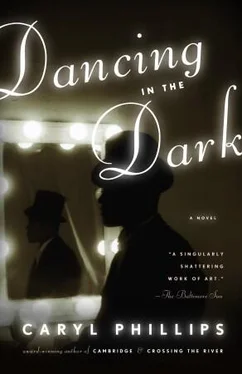I make my entrance with only a small spotlight penetrating the darkness. I thrust my white-gloved hands through the curtains and into the light. Before they see me they see my gloved hands twisting and turning, and then they make out the rest of me as I carefully edge my way between the heavy velvet drapes and stand still and slowly look all around. They do not know what to do. It is only when I move that the problems begin. I shuffle and they laugh. I show them that I am clumsy and they laugh. I stand still and they do not know what to do. Until I move I might be pitiable. It is only when I move that they recognize me. I enjoy the beginning, with my white gloved hands, and the small spotlight, and edging my way through the curtains and standing still. But they require both the cork and the movement, the broad nigger smile and the shuffle, and only then do they know me. Only then am I welcome in their house.
The white cliffs of Dover are white. It is morning and the whole company is on deck, their necks rolled in scarves, their hands holding collars tight, staring at England rising up through the mist. The first light of dawn is igniting the sea, and somewhere in the distance the forlorn howling of foghorns drifts through the gloom. Above their heads a thin line of gulls dip on the early morning breeze and then bank steeply away from the ship in the direction of the open sea. Lottie holds her husband’s arm and gently tugs him closer to her. The midwest suddenly seems a long way distant, but she realizes with both surprise and pride that her new husband has traveled even farther than she has. If only Flo could see her now; in Europe with her husband’s company, standing near the prow of the SS Aurania , bringing colored America to England. America’s Shylock Homestead looks down at her, a thin smile creasing his lips, and she recognizes loneliness behind his sad eyes and wishes more than anything in the world that there was some way for her to bring sunshine into his life. She looks up at him and smiles and then a sudden gust of wind threatens to dislodge her hat and she quickly reaches up a hand and clamps it down on her head. Might England be a new beginning for them both? She asks the question, but only with her eyes.
He walks alone in Hyde Park, where he observes the persistent wind blowing furiously at the dresses of young women, and where he tips his hat to passersby, who in turn are keen to tip their hats to the colored stranger. At all times of the day and night a fog seems to hang over the city like a giant cloud that is reluctant to disperse. A plump-lipped but otherwise slack-faced woman, with an off-white egg of a face, tries to engage him in conversation. He can see that the woman dresses well, but it soon strikes him that her expensive tastes merely mask the fact that she is one who walks the streets for profit and he promptly hurries on his way. He detects a problem in this sad city, under its thick blanket of despair, and he chooses a park bench by a pond and sits in order to better examine these people. He notices that despite the cold this pond is not capped with ice, and then he turns his attention to the faceless people, their heads hanging low, a seemingly endless caravan of misery. They trudge with shoulders hunched and with furled umbrellas in tightly clenched hands, and then he realizes that even the spring flowers that surround him appear to be pouting. Where is the joy in this country, or among these people? Where is the energy? Already he is wary of how Williams and Walker will be received once In Dahomey opens. He wants to feel comfortable in this new country, but the beat is wrong. Something is out of tune in England, and he knows that his company, huddled away in their cramped rooms at the damp hotel, they feel it too.
He sits in his Shaftsbury Avenue dressing room and he stares into the mirror. The booking agent has urged him to understand that the English audiences will expect a certain type of Negro authenticity, but what the man does not know is that a determined George has made sure that their own performers can never stoop to deliver such crude “authenticity.” The booking agent has led Bert to believe that the patrons of the English theater are probably waiting for their American visitors to take to the stage and entertain them with a volley of raggy coon songs, while all the time winding their tan behinds at them like flags. If this is the case, then in all likelihood Williams and Walker will probably disappoint their hosts, but it is too late now, for the impatient English stage manager is already stalking the corridors. (“Come along, my sons. Chop-chop.”) The man bellows in his thick cockney tongue, demanding that the Yank darkies make their way to the wings, and as he does so Bert’s colored heart begins to pound.
The audience loves the dancing. A bold couple even takes to the aisle and imitates the Negro performers, who in turn stop and applaud their English impersonators. Ada refuses to applaud for she considers the audience disrespectful, and once they are all safely offstage she loudly conveys her dismay to George, who promises to discuss the situation with Bert. However, her husband is undisturbed by this English mimicry, for his primary concern is that they should attract a paying audience and therefore make their stay in this miserable country a short but profitable one. Once Ada has passed into the women’s dressing room, George stands backstage by himself and resolves to say nothing to Bert. The following evening another limey couple takes to the aisle and again a furious Ada refuses to applaud them.
The English critics are puzzled by In Dahomey , and in particular, they fail to understand why the vast majority of the colored girls are light-skinned with straightened hair. George gives a newspaper interview in which he explains at length about the popularity of hair-straightening products and skin-bleaching creams among colored women, but to a man the English critics seem disappointed by the very few specimens of genuine sable beauty upon their stage. Especially so, notes one apoplectic scribe, given the fact that the back-to-Africa theme appears to be so much in vogue among Negroes, and this subject matter, which falls squarely within the current theatrical craze of locating Americans in queer lands, would seem to demand some genuine exoticism. Are we to assume, he thunders, that these near-white creatures in highly unlikely complex costumes, and displaying exquisite and alluring mannerisms, are the type of creatures that we would find were we to journey to that dismal continent? This one man lambastes the whole enterprise as “preposterous,” but his voice is not in the majority. Each evening a respectable audience flows up Shaftsbury Avenue from Piccadilly Circus to witness the Negro players and enjoy the spectacle of them performing their newly fashionable dance, the cakewalk; and then, a few weeks into their engagement, they receive the honor of a royal visit, which serves only to confirm the newfound English celebrity of Messrs. Williams and Walker. A week after the highly successful royal visit, the whole company receives the ultimate accolade of a command to perform privately in the garden of the king’s residence, Buckingham Palace.
In size as well as ability is Mr. Bert Williams a big comedian, and in the vicinity of Shaftsbury Avenue, where he is frequently to be seen striding his way lurchingly to and from the theatre, with his great head turning curiously and solemnly first one side and then another, like an elephant on the broad path (“Bun Avenue”) at the Zoo, he is already known as “Big Black Bert.” The delightful thing about his impersonation of Shylock Homestead is that the actor, not withstanding that it is to him chiefly the audience looks for amusement, is never seen forcing the fun or pushing himself forward in the least. With his heavy, rocking gait, he “hovers around” like one who has found himself on the stage by taking the wrong passage, and thinks he may as well stay there since no one has interfered with him.
Читать дальше












